
article in zine format
By 7 A.M on April 8th, the Phoenix Convention Center ballroom was beginning to fill up. Attendees included local law enforcement and top officials from an alphabet soup of agencies: the U.S. Border Patrol (USBP), U.S. Customs and Border Protections (CBP), Immigration and Customs Enforcement (ICE), the Drug Enforcement Administration (DEA), the Department of Homeland Security (DHS), and the Transportation Security Administration (TSA).
Also in the crowd were hundreds of guests involved in the weapons, detention, and surveillance industry eager to make an extra buck as the Trump administration ramps up their deportation efforts.

Welcome. This event is brought to you by a Guantanamo Bay contractor.
The entrance doors were wrapped with an advertisement for Akima Infrastructure Protection, a private contractor that was awarded a five year $163.4 million ICE contract to oversee the Guantanamo Bay Migrant Operations Center at the tail-end of the Biden administration. Akima was the prime sponsor of the Border Expo alongside Peraton, an IT company previously responsible for a major data breach that’s now developing a massive biometrics database (Homeland Advanced Recognition Technology System) for DHS. Other prime sponsors included private prison company Core Civic and BAE Systems, the UK-based weapons manufacturer supplying the Israeli and Saudi military in their bombing campaigns in Gaza and Yemen.
Everyone was gathered early on Tuesday, April 8 to hear “border czar” and anti-immigration extremist Tom Homan deliver the opening remarks of the 18th annual Border Security Expo. After arriving 30 minutes late, Homan walked out to a standing ovation.
“I’m one of the most hated men in America,” he remarked.
Militarized Border Industrial Complex: AI Startup Edition
In a panel alongside Homan, ICE Director Todd Lyons expressed a desire to run the deportation process “like a business,” saying he wants it to run “like Amazon Prime but with human beings.”
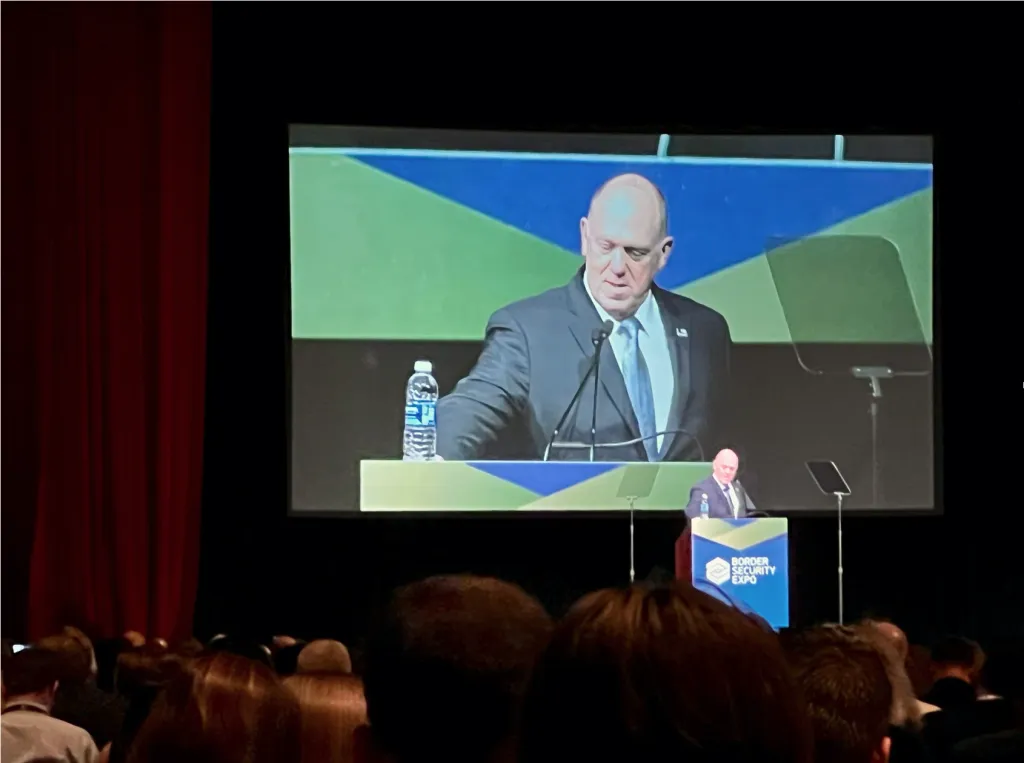
Not enough boos in the world for this man.
Homan was similarly blunt about the nature of the conference. In his solo speech, Homan expressed a “need” for more resources to increase enforcement in so-called Sanctuary Cities and run DNA tests on immigrant families. He also fantasized about “eradicating” every “public safety threat,” “national security threat,” and “illegal alien criminal.”
A frightening comment as the Trump administration increasingly targets voices who are critical of the genocide in Gaza and deports hundreds of immigrants with no due process under highly dubious accusations of gang or terrorist affiliations. An investigation by 60 Minutes found that at least 75% of the men sent to El Salvador’s Terrorism Confinement Center, a slave labor prison, had no criminal record.
ICE appears similarly eager to deport people for speech. A day after the Border Security Expo, the agency posted and deleted an image on their social media saying it’s their job to remove “people, money, products, ideas” that cross the U.S. border.
“ICE is kicking butt. Their numbers are good, but not good enough for me. I want more,” Homan said, addressing the industry leaders directly.
“We need to find more beds. We need more airplane flights. And I know a lot of you are here for this reason. We need more smart people – contractors and companies that can come in and help us complete our mission.”

Ah sweet, man-made horror beyond my comprehension.
The exhibitor hall was packed with over 200 companies hoping to win the high-priced contracts that keep these surveillance, deportation, and detention operations functioning. The majority were touting the way their products have implemented so-called artificial intelligence (AI). Other keynote speakers included Joshua Powell, CBP’s Chief AI Officer, and Jason Hirsch, a former AI policy lead at Meta.
“Now we’re moving into the world of Generative AI, which buzzword or not, I think we’re going to start working into a world where AI is in every product that we have,” said Powell.
Simultaneously in D.C., AI evangelists were arguing in favor of “total AI dominance” and directing massive amounts of energy to their industry at a 4-hours House Energy and Commerce Committee hearing.
”We need energy in all forms. Renewable, nonrenewable, whatever. It needs to be there and it needs to be there quickly,” testified former Google CEO Eric Schmidt.
Most of the products on display included some form of algorithmic AI specializing in facial recognition, social media monitoring, location tracking, voice recognition, web browsing data, surveillance software, behavior analysis, and even eliminating targets.
For a PDF chock full of the exhibitors’ offerings, click here.
In the center of the exhibitor hall was a large display mimicking the aesthetic of an Apple Store advertising Anduril Industries, a California based defense tech company, and their range of autonomous attack drones and surveillance systems.
Anduril was co-founded in 2017 by Palmer Luckey, the creator of Oculus Rift, former Facebook executive, and brother-in-law of alleged child sex trafficker Matt Gaetz. Anduril, like Peter Thiel’s Palantir, is a nod to JRR Tolkein’s Lord of the Rings, referring to a magical sword in the books called the “Flame of the West.” Thiel’s own venture capital fund also played a central role in the formation of Anduril.
The eccentric CEO has even prototyped an “if you die in the game, you die in real life”-type VR headset that would blow out the user’s brain with explosives.
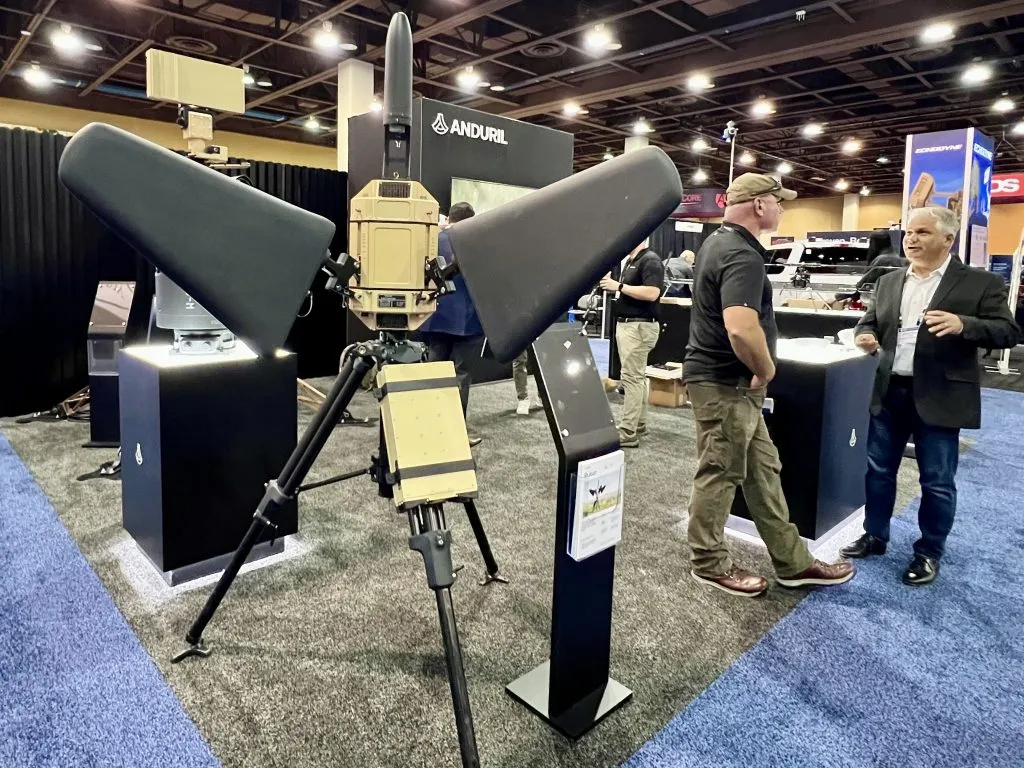
War profiteers stop with the LOTR references challenge: impossible.
Luckey vocally seeks military partnerships, hoping to challenge the market of traditional war profiteers (e.g. Lockheed Martin, Northrop Grumman) and write the blueprint of the future of AI-war tech. In March 2025, Anduril was awarded a $642 million contract with the Pentagon and a $86 million contract with the U.S. Special Operations Command, adding to the $22 billion U.S. Army high-tech goggles deal announced in February.
“There will be people who are killed by AI who should not have been killed. That is a certainty if artificial intelligence becomes a core part of the way that we fight wars,” Luckey said last year in an interview with Bloomberg.
Lavender, an “AI”-powered database used by the Israeli military to target tens of thousands of Palestinians, has been heavily criticized as a war crime.
Anduril’s autonomous Sentry surveillance tower loomed over the exhibitor hall. The device, capable of reaching 80 feet high, lines the U.S.-Mexico border in a partnership with CBP.
In a panel on AI and National Security, former DHS chief information officer Luke McCormack and former DHS Secretary Elaine Duke cited Anduril as a central partner with DHS as they adopt more AI technologies into their department. Duke said the company is “very heavily used on the Southwest border.”
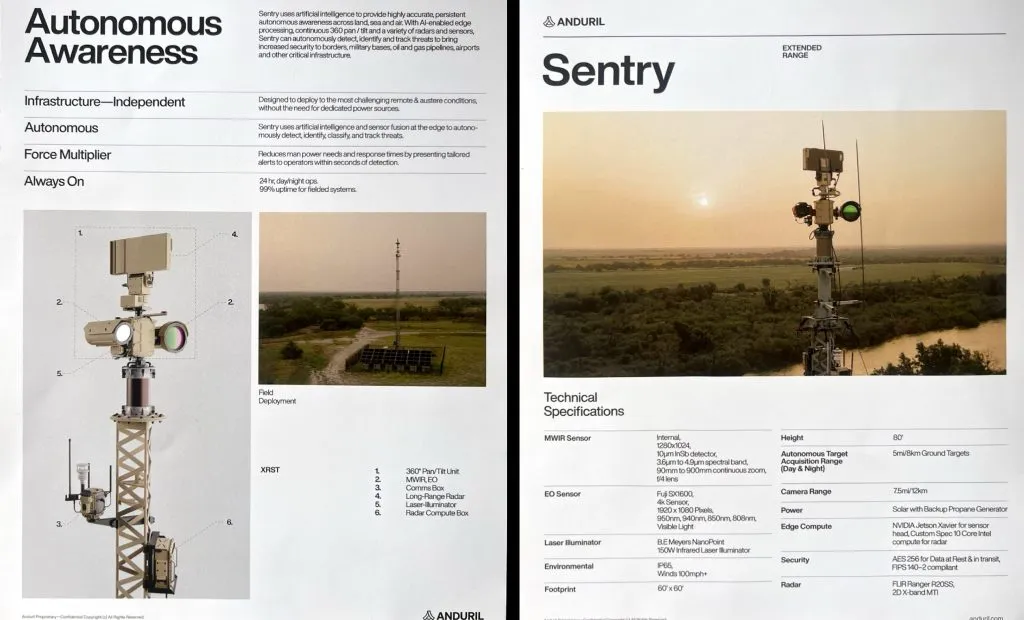
Silicon Valley meets border surveillance.
Axon, the lead manufacturer of police tasers and body-cameras, showed off their newest tech which included an aerial situational awareness drone, AI services, and the newest model of their electric-shock weapon. The Axon vendor showed off the TASER10’s 45-foot shooting range and bragged that it could be shot up to 10 times without the need to reload. They offered demonstrations of their taser in-action.
The Scottsdale-based business has faced controversy for their pseudoscientific term “excited delirium” diagnosis, which attempts to hide the number of deaths caused by their “non-lethal” weapons. I asked the vendor about deaths attributed to Axon products, which he denied.

Recently, Axon’s billionaire CEO Rick Smith has been threatening to leave the state unless Arizona lawmakers pass legislation that would block Scottsdale voters from holding a referendum challenging the company’s plans to build a 74-acre megacampus. The move to disenfranchise voters in favor of Axon has earned bipartisan support as it moves through the legislature.
Other companies promoted more traditional forms of border security enforcement like Cochrane USA, which displayed samples of their concertina wire-lined fencing and the deadly floating barrier fitted with circular saws seen in the Rio Grande.
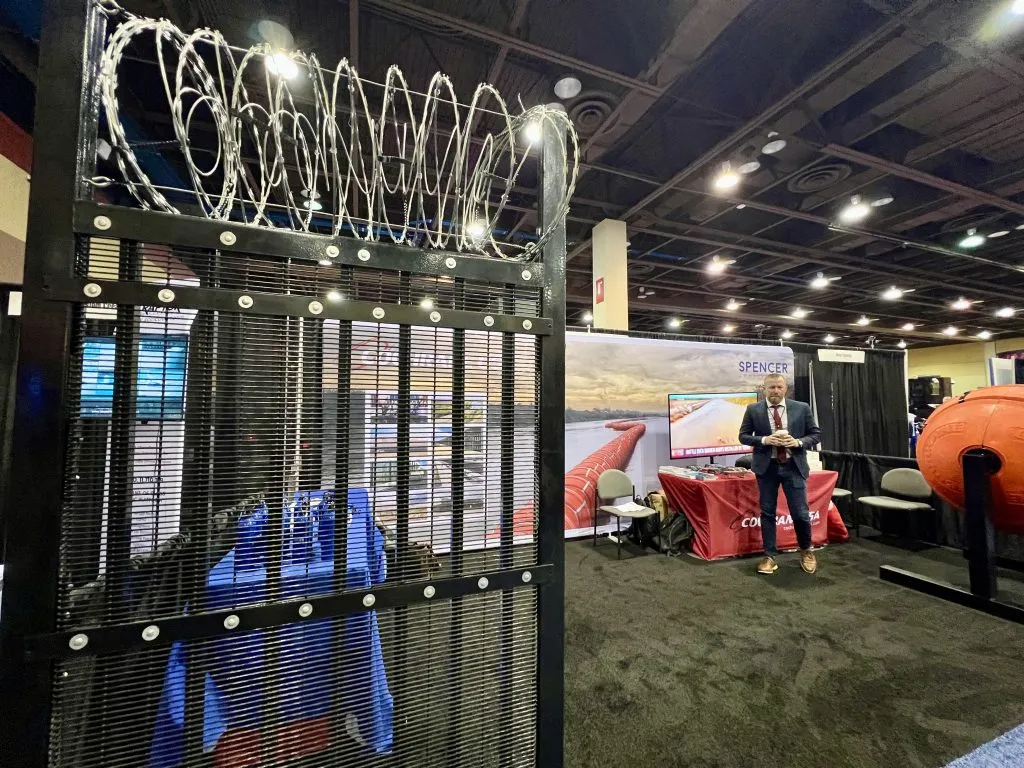
A spokesperson with Atkore, a security firm currently being sued for misleading investors, showed off a sample of their chain link fence interlaid with razor-blades.
Even seemingly mundane merchandise, like rapidly deployable tents, had a sinister aura as Trump allies like former Blackwater CEO Erik Prince pitched a network of “processing camps.”
Trade Show from Hell
Drones and robot dogs filled the exhibitor hall. The sound of gunshots were routinely blasting over the confusingly pop-heavy playlist featuring the tunes of Lana Del Rey, Katy Perry, and LMFAO.
The gunshots were coming from VirTra, an Arizona-based company specializing in hyper-realistic simulators meant to train law enforcement. The VirTra tent was lined with screens where you could shoot your way through demonstrations of their bloody mass shooter and hostage scenarios with laser guns that mimic firearm recoil.
Other businesses with links to the state included Strongwatch, a Tucson company that provides border-related surveillance systems and SoundThinking, previously ShotSpotter, that has been used to detect gunfire by the Glendale Police Department since 2002 despite the concerns about its inaccuracy.
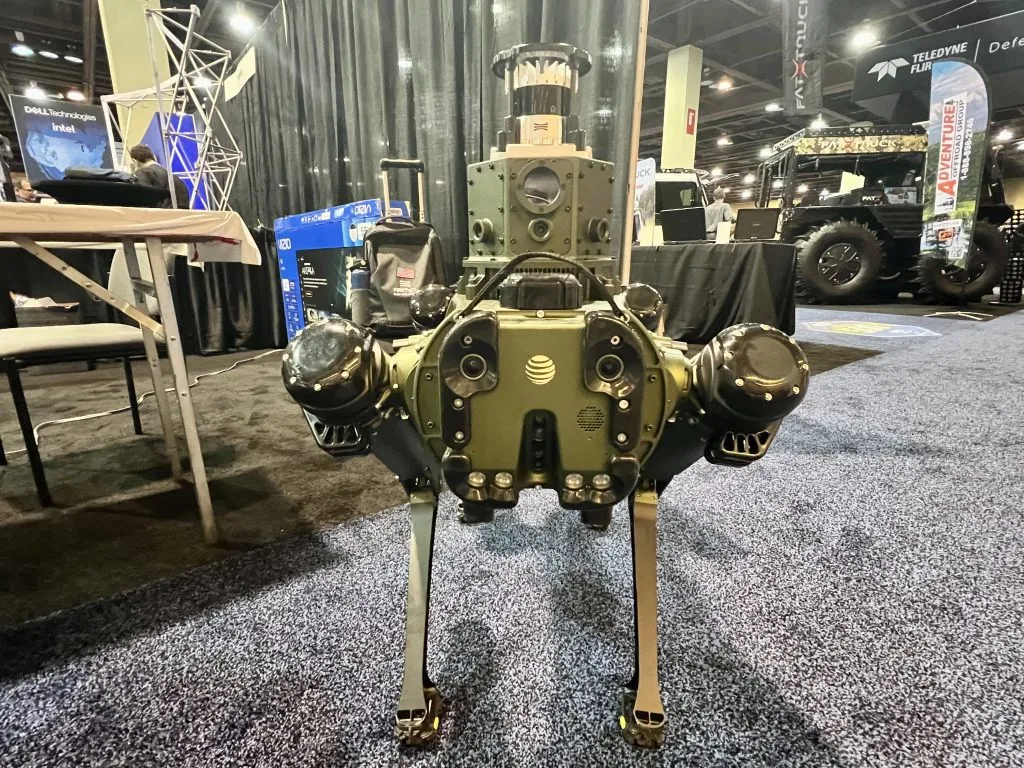
AT&T presents: Nightmares
QinetiQ, a UK-based defense company, promoted their high-altitude surveillance pseudo-satellites which are tested in the Arizona desert and a serious concern of privacy advocates. CACI International Inc., a private contractor which has presence at the Luke Air Force Base and Davis-Monthan Air Force Base, was also advertising their services to the room of law enforcement and immigration officials. CACI International was previously found liable for providing torturous interrogation services at the Abu Ghraib prison.
CACI also sponsored the Border Security Expo afterparty alongside the Border Patrol Foundation, Anduril, and Elbit Systems.
It’s no surprise Arizona has become a recurring host state for the Border Security Expo with an increasingly militarized border and the prevalence of private detention centers. Florence, Eloy, and Wilcox have even earned reputations as “prison towns.”
The GEO Group and CoreCivic, which operate these private prisons and ICE facilities, were also present at the event, as was GEO’s poorly-designed and frequently malfunctioning electronic-tracker equipment company, BI Incorporated. GEO Group has faced legal challenges due to the concerning practices in their facilities and lack of efficient medical care. Last month, GEO Group executives reportedly expressed excitement over the “unprecedented opportunities” as the Trump administration increases efforts towards deportation.
Documents recently obtained by the American Civil Liberties Union detailed ICE’s plans to open new detention facilities and expand current operations operated by GEO and CoreCivic.
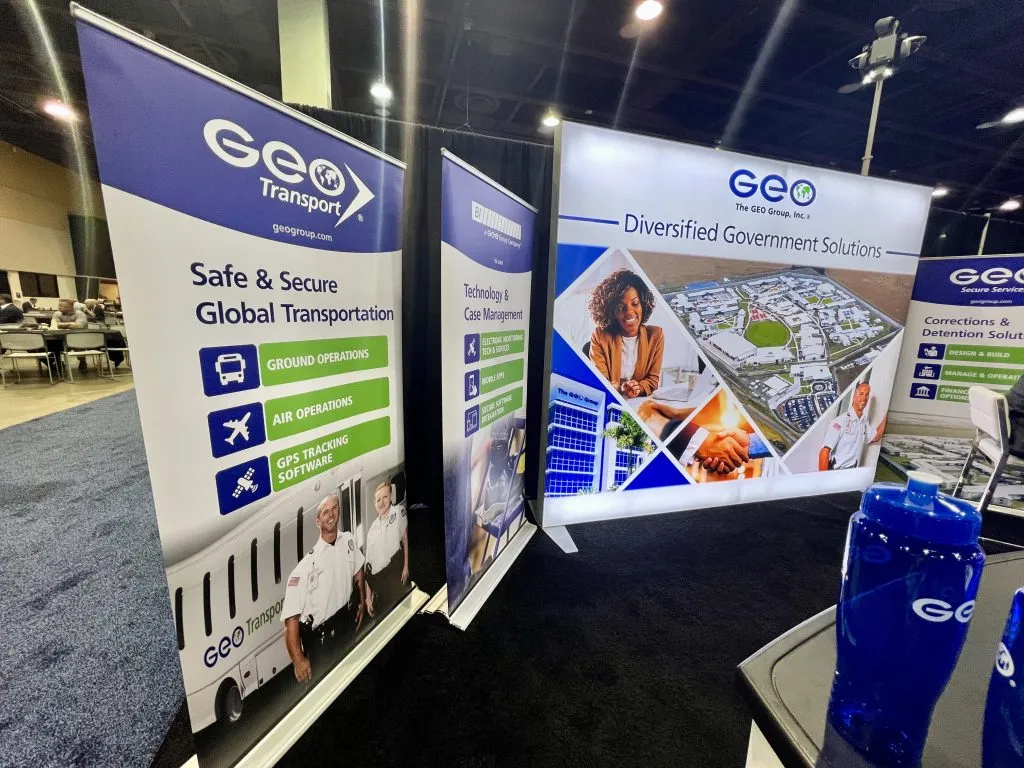
A booth for the private prison company, The GEO Group, Inc. Banners for the private prison company are a colorful blue, lime green, and white with images of people smiling, shaking hands and posing for pictures in front of a GEO transportation bus. The text on the sign reads, “Safe and secure, global transportation, ground operations, air operations, GPS tracking and software.” Another sign for their subsidiary, BI, reads, “Technology and case management, electronic Monitoring, tech and services, mobile apps, secure software integration.” In front of the large banner advertisements is a blue reusable water bottle with an logo for GEO.
GEO and BI Inc.’s booth offered a bizarre array of branded merchandise – bag chip clips, spearmint flavored chapstick, reusable water bottles, a fishing lure.
Other companies distributed cheap merchandise with their logo stamped on it. Botach Tactical, a law enforcement retail supplier, gave out stickers of characters from The Office kitted out in Botach-branded military gear. D-Fend Solutions, another frequently malfunctioning company that “specializes” in counter-drone technology, handed out a neon Y2K-style liquid hourglass.
Mr. Target, a shooting range company based out of Tempe, offered a morale patch with a self-admitted reference to Tropic Thunder’s “never go full retard” line. The manufacturer brags of their customer base including the U.S. Army, DHS, U.S. Marine Corps, the Department of Justice, U.S. Secret Service, and FBI.
The Puppy Killer Takes the Stage
Following his speech, Tom Homan traveled to the Arizona Capitol to express support to the Republican legislature as they attempt to pass a series of anti-immigration bills. Democratic lawmakers walked out as they held up the names of immigrants who have been detained and disappeared by the Trump administration — Mahmoud Khalil, Henrry Jose Albornoz Quintero, Rümeysa Öztürk, Kilmar Armando Abrego Garcia, Andry José Hernandez Romero.
Homan praised Joe Arpaio and his willingness to work with border enforcement during his 24-year reign as Maricopa sheriff—an era that was plagued by racial profiling and human rights abuses at Arpaio’s deadly concentration camp, Tent City Jail. Arpaio, now 92, sat in the audience alongside his antisemitic Groyper-aide Kevin Decuyper.
House member Joseph Chaplik thanked Homan for the visit and claimed to have given him a “tip” about an apartment complex that allegedly houses migrants.
At the same time, DHS Secretary Kristi Noem was headed to address the Border Security Expo after cosplaying alongside anti-LGBTQ propagandist Chaya Raikchik, aka Libs of TikTok, as DHS and ICE conducted morning raids in Phoenix.
Raichik bragged about getting “exclusive footage” of the raids and described the men detained as gang members “with long rap sheets.” Noem called them “dirtbags” and accused them of human and drug trafficking. None of the three men arrested were charged with the crimes Noem accused them of and two had no previous criminal history.

Noem showing off her gun expertise and Raichik showing off her expert boot polishing skills.
Noem was the first Secretary of Homeland Security to address the Border Security Expo. Like Homan, she was similarly candid in telling the industry leaders in the audience that the Trump administration is looking to expand their surveillance and deportation operations.
“We need the infrastructure and the detention centers to hold people. We are scooping up individuals, getting that infrastructure in place, and putting this operation on steroids so that we can do it faster and make sure that we’re doing our job more effectively for President Trump,” said Noem.
She cited the reworking of the CBP One app, now CBP Home, as an example of tech infrastructure that could be used to assist deportations. Under the Biden administration, CBP One became the only means for asylum seekers to request asylum and schedule immigration hearings. It was unreliable and limited in accessibility. The day of his inauguration, Trump ordered the shutdown of CBP One and all appointments were canceled.
In March, it was rebranded as CBP Home as a way for migrants to report self-deportation. The day of Noem’s Border Expo speech, CBP Home issued a message ordering its users to leave the United States. DHS had revoked residence and permits of those who had previously applied for asylum through the app.
Noem credited Elon Musk “and his guys” for refitting CBP One to CBP Home.“I know you’ve heard a lot of things in the press and a lot of discussion about the value of what Elon and DOGE are doing. I think the Department of Homeland Security has been their biggest partner. I welcome their eyes and their ideas and looking into every aspect of our department,” she said.
In her speech, Noem also recounted her experience touring the Center for the Confinement of Terrorism (CECOT) mega-prison in El Salvador where she filmed a propaganda video in front of a cage packed with dozens of detainees. She said the main reason for her visit was to ask President Nayib Bukele if he would expand their partnership and take more prisoners from the United States.
According to Noem, Bukele enthusiastically agreed, allegedly stating: “I will take as many as you want to send me, because here we have consequences. When they go into CECOT, they will never leave, they will always be here, and they will never leave.”
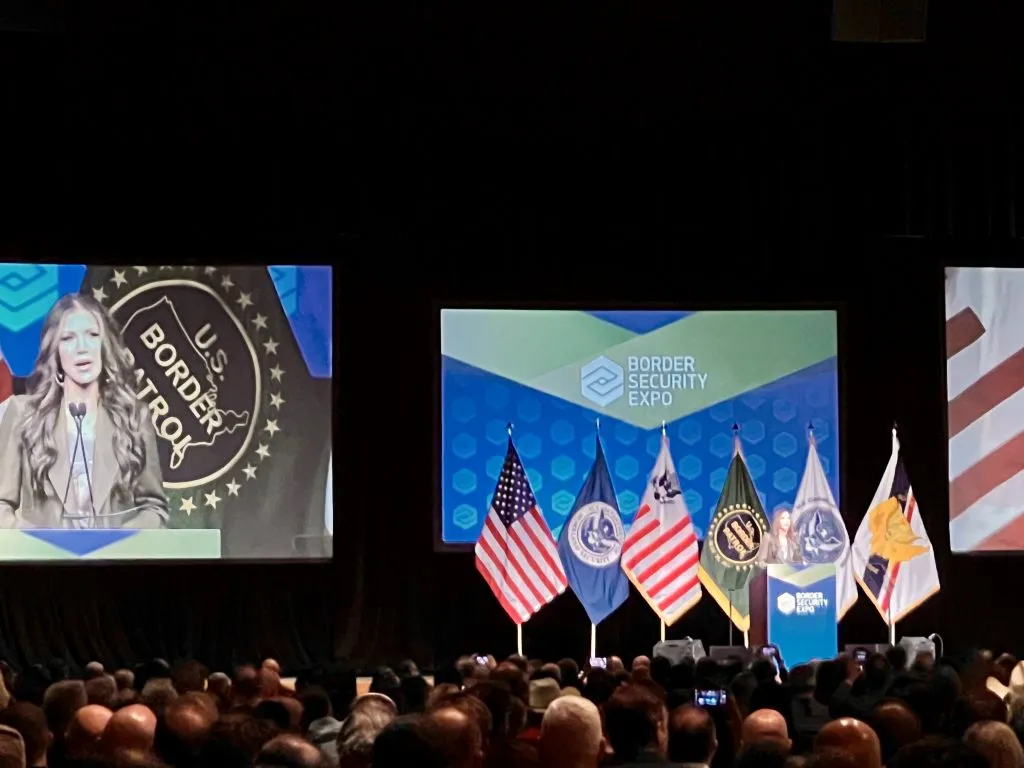
Noem addressing the Border Security Expo.
In a tale meant to “inspire” the audience, Noem also justified the creation of CECOT as a means to protect Target retail chains and keep toothpaste from being locked up. Noem was citing the organized shoplifting panic, a myth police departments and surveillance companies (like Axon) generated to get more funding.
“There will be ways that industry can partner with us. We’re using new technologies in ways that we never had before. We’re going to deploy new technologies, not only at the border, but at our ports of entry and in our interior to make sure that we’re sharing information with other agencies at all levels.” Noem said. “And we’re also going to be sharing more information, biometrics, DNA testing.”
During a Q&A at the end of her speech, an audience member asked Noem: “Where do we cross the line in protecting our citizens versus spying on our citizens?”
As the various drones, watch-towers, cameras and microphones in the Expo hall watched and listened, Noem responded, “Well we definitely have not been spying on our citizens.”
